Kerry:Mission Accomplished
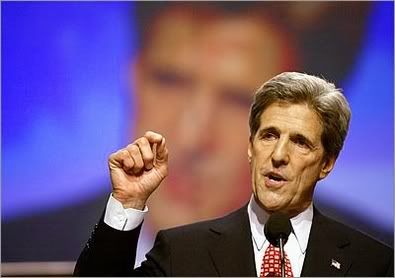
BOSTON - John Kerry rose to the occasion Thursday night. Giving the best speech of his campaign for the presidency, he successfully and concisely defined himself as a man of character capable of leading the nation in a time of war.
If the goal of an acceptance speech is to introduce a candidate positively to voters who may have only a vague sense of them, Kerry did it. By attacking Republicans where they have been historically strongest – security, "family values" and faith – he made tangible steps toward establishing the issues as Democratic in belief, a central strategy of the Kerry campaign.
With 17 mentions of the words "strength" or "strong" and 16 mentions of the word "values," the message Kerry attempted to get across was that as a Democrat he can defend a nation and morally embody it as well. It was the standard bearer of the Democratic Party reclaiming issues they lost decades ago.
“This speech was the best John Kerry has ever done,” said Louisiana Sen. Mary Landrieu, yelling over the noise of the convention floor, the hall covered in balloons, Van Halen blaring.
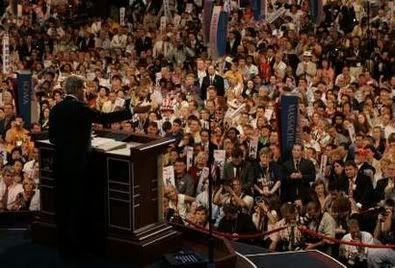
“We are so energized by this man,” she continued. “You hear Bill Clinton speak and you think how great he is. Tonight, when John Kerry finished speaking you looked around and said how great we are. It was just magnificent.”
As evidence of the speech's impact on the Democratic base, the Kerry campaign announced at midnight that it had raised $5.2 million on Thursday, breaking the record of $3 million they raised the day before.
Other speeches had brought more people to their feet in Boston’s FleetCenter, but there was a sense among those in the packed convention hall that a serious address was suitable.
More importantly, the sense among experts was that outside the arena, in the America where 46 percent do not have a clear view of the Democratic nominee, Kerry successfully defined himself and may have reached undecided voters.
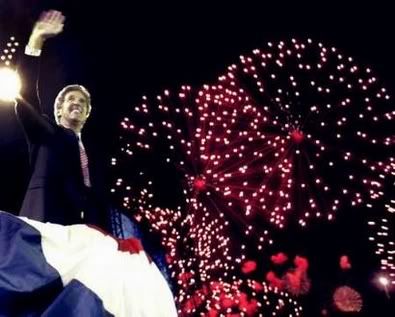
“I think finally today the Kerry campaign began to paint who this guy is and he could have well have made some significant headway in reaching those undecided voters,” said Stu Rothenberg, editor of the nonpartisan Rothenberg Political Report.
“He made people comfortable with John Kerry as president of the United States, as commander-in-chief.”
The speech showed John F. Kerry modeling himself on his political idol, John F. Kennedy. Mentioning Kennedy’s “call to service” early in his address, his voice rising as he tapped the podium, Kerry appeared confident, invigorated by the audience from the outset.
Like the first Catholic president from Massachusetts, Kerry emphasized his military experience in vivid detail, spoke optimistically about America, stressed fiscal responsibility and above all, spent nearly a third of his address attesting that he is a most capable commander-in-chief.
Listing anecdotes of struggling Americans, he told the audience six times that "help is on the way." Matching the theme of "hope is on the way" utilized in last night's address by running mate John Edwards," Kerry mostly used the plain language and sound bites that his party had hoped to hear.
After four days of the Democratic National Convention almost myopically focused on Kerry’s national security credentials, he finally spoke directly about his experiences in war.
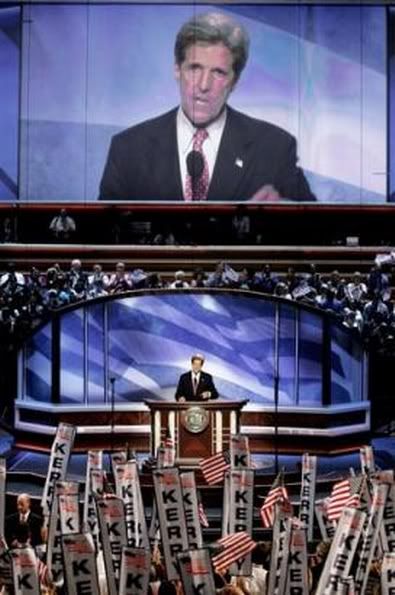
“I know what kids go through when they are carrying an M-16 in a dangerous place and they can't tell friend from foe,” he said. “As President, I will bring back this nation's time-honored tradition: the United States of America never goes to war because we want to, we only go to war because we have to.”
Speaking of his days commanding a swift boat in Vietnam and obliquely contrasting himself with President Bush’s avoidance of service overseas during the war, Kerry proclaimed, “I will wage this war with the lessons I learned in war.”
The central tenet of Kerry’s criticism of Mr. Bush’s handling of the war in Iraq is that the U.S. military is overly committed because our traditional allies have been estranged by a belligerent policy.
By not saying the more than 800 U.S. fatalities in Iraq did not have to occur – as many delegates on the floor believe – Kerry avoided the overt attack on the president many Democrats had hoped to hear.
“He is speaking to the undecided voters, the anti-Bush is so strong, he can take almost any position and he still has Democrats,” said Merle Black, a professor at Emory University in Atlanta who spoke by phone from his home.
“He looked good. He looked really energetic, relaxed and confident,” Black said of how he appeared on television.
“At some point he needs to say if you are going to replace the guy what are you going to be that different. But I think most people who saw him for the first time would have a favorable impression and it was wise for him to not directly engage the president.” [CBS]
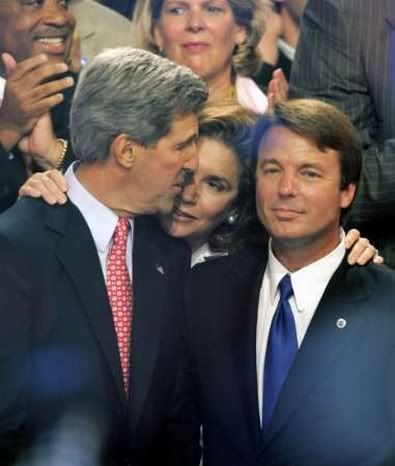
No retreat, no surrender
Shedding caution, John Kerry takes the fight to George W. Bush -- and gives the speech of his life.
BOSTON - All week long, the Kerry-Edwards campaign has tried to keep a lid on the emotion -- anger about an election stolen, sadness about an America lost -- that is driving the Democrats' desire to oust George W. Bush. Thursday night in Boston, it finally became clear why: Kerry was trying to save it all for himself.
The Democratic presidential nominee stormed into the Fleet Center to Bruce Springsteen's "No Surrender," and he never did. Nearly an hour after saying, "I'm John Kerry and I'm reporting for duty," Kerry was still at his post, delivering a sustained attack on the Bush administration -- and a hopeful plea for the future -- that was as passionate, in Kerry's own way, as any speech Al Sharpton could ever hope to deliver.
"Now, I know there are those who criticize me for seeing complexities -- and I do -- because some issues just aren't all that simple," Kerry said. "Saying there are weapons of mass destruction in Iraq doesn't make it so. Saying we can fight a war on the cheap doesn't make it so. And proclaiming 'mission accomplished' certainly doesn't make it so."
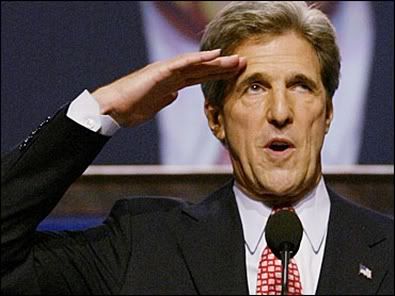
Going straight after the Republican defense of Bush's war on Iraq -- the president didn't lie, he was misled -- Kerry said he will "ask hard questions and demand hard evidence. I will immediately reform the intelligence system -- so policy is guided by facts, and facts are never distorted by politics. And as president, I will bring back this nation's time-honored tradition: the United States of America never goes to war because we want to, we will only go to war because we have to."
Kerry, who had been criticized by some Democrats for what they thought was excessive caution in attacking Bush and his policies, started out slowly, but electrified the crowd when he took the gloves off. "I will be a commander in chief who will never mislead us into war," he said. "I will have a vice president who will not conduct secret meetings with polluters to rewrite our environmental laws. I will have a secretary of defense who will listen to the best advice of our military leaders. And I will appoint an attorney general who actually upholds the Constitution of the United States." [SALON]
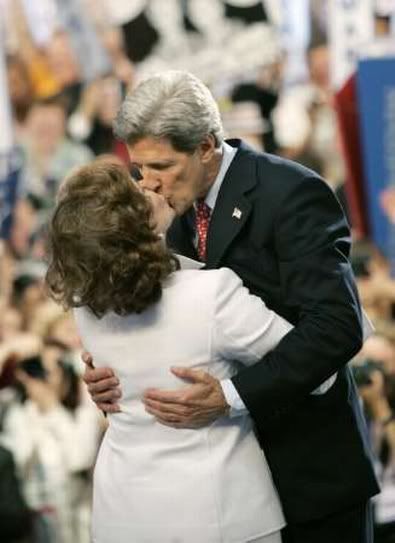
Kerry defines candidacy on values and security
BOSTON - John Kerry Thursday night presented himself as a future president of strength, faith and optimism, claiming on behalf of the Democratic party the same values championed by the Republicans as he accepted his party's nomination for president.
Flanked by his former crewmates from the Vietnam war, Mr Kerry promised to protect the US from the terrorist threat. “I will immediately reform the intelligence system so policy is guided by facts and facts are never distorted by politics,” he said. “As president, I will ask hard questions and demand hard evidence.”
Mr Kerry offered a subtle rebuke to President George W. Bush's patchy military record, contrasting it with his own time in combat. “I'm John Kerry,” he said, when he took to the podium and, then, saluting to the cheers of the crowd, added: “and I'm reporting for duty.”
Mr Kerry then made a bold grab for the middle ground of American politics, borrowing from the language of former two-term Republican president Ronald Reagan in pledging to lead a strong, united America, and reminding its citizens that “out best days are still to come.”
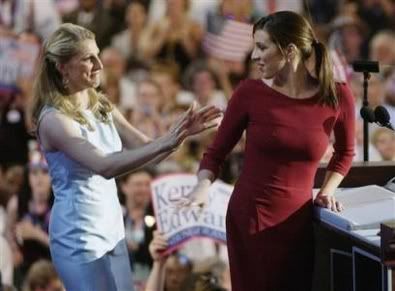
Reinforcing the positive theme that the Kerry campaign has sought to make the leitmotif of the week, Mr Kerry said: “We can do better and we will. We're the optimists.”
He also sought to banish the perception of a squeamish Democratic party: “I defended this country as a young man and I will defend it as president. Let there be no mistake: I will never hesitate to use force when it is required.”
With the Democratic convention behind him, Mr Kerry's monopoly of the limelight comes to an end today. After a week's holiday on his ranch in Crawford, Texas, Mr Bush returns to the campaign trail on Friday in the three most fiercely-fought states of the Midwest - Michigan, Missouri and Ohio.
Mr Kerry was welcomed onto the stage, after the delegates in Boston were treated to a glowing nine-minute video tribute tracing his story from childhood, his time as a student at Yale University, his command of a Swift Boat on the Mekong Delta and term as a US senator.
An even more personal and intimate testimonial was given by his two daughters, Alexandra and Vanessa, who extolled their father's family values - including the time he rescued the family hamster from drowning.
The Band of Brothers - the name given to Mr Kerry's Vietnam war crewmates - lined up to herald Mr Kerry onto the stage. Max Cleland, the former Georgia senator who lost three limbs in Vietnam, introduced the Massachusetts senator.
Mr Kerry made a point both of introducing his personal story to the audience, including details of his parents' past and his personal values, but also sought to give a laundry list of policy proposals of a future Kerry administration.
He reprised many of the themes and much of the phrasin, that has featured in stump speeches across the country for months. He set out his healthcare plans, emphasised the need to halt the exodus of US jobs overseas and, to rapturous applause, promised that he would not appoint an attorney-general with a disregard for the US constitution.
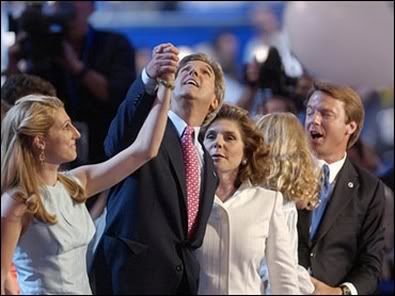
“There is nothing more pessimistic than saying America cannot do better,” Mr Kerry said, as part of a speech intended to emphasise optimism and unity in America.
Still, Mr Kerry criticised into Mr Bush repeatedly for misleading the American people over Iraq: “Saying there were weapons of mass destruction doesn't make it so.”
In the tradition of the barnstorming Clinton/Gore trip after the 1992 Democratic convention, Mr Kerry heads out on Friday with his vice-presidential running mate, John Edwards, taking his message of strong leadership from the national stage to the battleground states that will decide the 2004 election.
They will hit the stump together in rallies in New York, Connecticut and Pennsylvania on Friday. They will then tour other swing states before Mr Edwards branches off to make the Democratic case in Florida on Sunday night and Mr Kerry heads for the industrial heartland of Michigan and Missouri.
Campaign managers say Mr Kerry is the first candidate to travel uninterrupted by land from the Atlantic to the Pacific coasts since Harry Truman made his whistle-stop tour in 1948. The itinerary shows the Kerry campaign focusing on those battleground states that Mr Bush won in 2000 but now seem to be wavering in their support for the president.
Mr Bush has allowed the Democratic challenger to monopolise the limelight over the past week. But after a week’s holiday Mr Bush returns to the cam paign trail in the industrial Midwest as he works up towards the Republican national convention in New York in late August. [Financial Times]
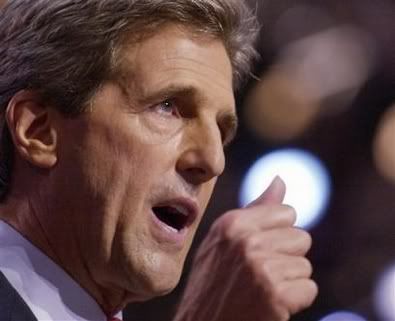
Text of John Kerry's acceptance speech
I'm John Kerry, and I'm reporting for duty.
We are here tonight because we love our country. We're proud of what America is and what it can become.
My fellow Americans, we're here tonight united in one purpose: to make America stronger at home and respected in the world.
A great American novelist wrote that you can't go home again. He could not have imagined this evening. Tonight, I am home ... home where my public life began and those who made it possible live; home where our nation's history was written in blood, idealism and hope; home where my parents showed me the values of family, faith and country.
Thank you, all of you, for a welcome home I will never forget.
I wish my parents could share this moment. They went to their rest in the last few years. But their example, their inspiration, their gift of open eyes – open eyes and open mind and endless heart and world that doesn't have an end are bigger and more lasting than any words at all.
I was born, as some of you saw in the film, in Fitzsimmons Army Hospital in Colorado when my dad was a pilot in World War two. Now, I am not one to read into things, but guess which wing of the hospital the maternity ward was in?
I'm not kidding. I was born in the West Wing.
My mother was the rock of our family, as so many mothers are. She stayed up late to help me with my homework. She sat by my bed when I was sick. She answered the questions of a child who, like all children, found the world full of wonders and mysteries. She was my den mother when I was a Cub Scout, and she was so proud of her 50-year pin as a Girl Scout leader.
She gave me her passion for the environment. She taught me to see trees as the cathedrals of nature. And by the power of her example, she showed me that we can and must complete the march toward full equality for all women in the United States of America.
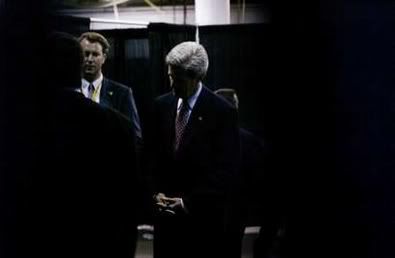
My dad did the things that a boy remembers. My dad did the things that a boy remembers. He gave me my first model airplane, my first baseball mitt, my first bicycle. He also taught me that we are here for something bigger than ourselves. He lived out the responsibilities and the sacrifices of the greatest generation to whom we owe so much.
And when I was a young man, he was in the State Department, stationed in Berlin when it and the world were divided between democracy and communism.
I have unforgettable memories of being a kid mesmerised by the British, French and American troops, each of them guarding their own part of the city, and Russians standing guard on that stark line separating East from West. On one occasion, I rode my bike into Soviet East Berlin, and when I proudly told my dad, he promptly grounded me.
But what I learned has stayed with me for a lifetime. I saw how different life was on different sides of the same city. I saw the fear in the eyes of people who were not free. I saw the gratitude of people toward the United States for all that we had done. I felt goose bumps as I got off a military train and heard the Army band strike up Stars and Stripes Forever.
I learned what it meant to be America at our best. I learned the pride of our freedom. And I am determined now to restore that pride to all who look to America.
Mine were Greatest Generation parents. And as I thank them, we all join together to thank a whole generation for making America strong, for winning World War 2, winning the Cold War and for the great gift of service which brought America 50 years of peace and prosperity.
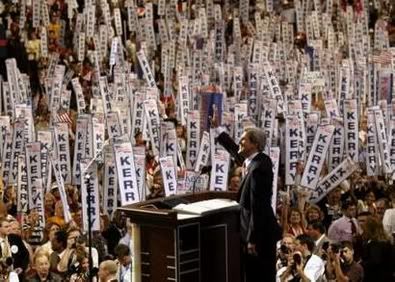
My parents inspired me to serve, and when I was in high school, a junior, John Kennedy called my generation to service. It was the beginning of a great journey, a time to march for civil rights, for voting rights, for the environment, for women, for peace.
We believed we could change the world. And you know what? We did. But we're not finished. But we're not finished. The journey isn't complete; the march isn't over; the promise isn't perfected.
Tonight, we're setting out again. And together, we're going to write the next great chapter of America's story.
We have it in our power to change the world, but only if we're true to our ideals. And that starts by telling the truth to the American people.
As president, that is my first pledge to you tonight: as president, I will restore trust and credibility to the White House.
I ask you, I ask you to judge me by my record. As a young prosecutor, I fought for victims' rights and made prosecuting violence against women a priority.
When I came to the Senate, I broke with many in my own party to vote for a balanced budget, because I thought it was the right thing to do. I fought to put 100,000 police officers on the streets of America.
And then I reached out across the aisle with John McCain to work to find the truth about our POWs and missing in action and to finally make peace in Vietnam.
I will be a commander in chief who will never mislead us into war. I will have a vice president who will not conduct secret meetings with polluters to rewrite our environmental laws. I will have a secretary of defence who will listen to the best advice of the military leaders. And I will appoint an attorney general who will uphold the Constitution of the United States.
My fellow Americans, this is the most important election of our lifetime. The stakes are high. We are a nation at war: a global war on terror against an enemy unlike we've ever known before.
And here at home, wages are falling, health-care costs are rising, and our great middle class is shrinking. People are working weekends - two jobs, three jobs - and they're still not getting ahead.
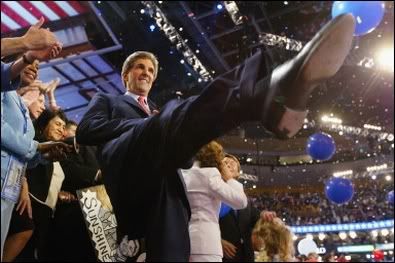
We're told that outsourcing jobs is good for America. We're told that jobs that pay $9000 less than the jobs that have been lost is the best that we can do. They say this is the best economy that we've ever had. And they say anyone who thinks otherwise is a pessimist.
Well, here is our answer: There is nothing more pessimistic than saying that America can't do better.
We can do better, and we will. We're the optimists. For us, this is a country of the future. We're the can-do people.
And let's not forget what we did in the 1990s: we balanced the budget. We paid down the debt. We created 23 million new jobs. We lifted millions out of poverty. And we lifted the standard of living for the middle class.
We just need to believe in ourselves and we can do it again.
So tonight, in the city where America's freedom began, only a few blocks from where the sons and daughters of liberty gave birth to our nation, here tonight, on behalf of a new birth of freedom, on behalf of the middle class who deserve a champion, and those struggling to join it who deserve a fair shot, for the brave men and women in uniform who risk their lives every day and the families who pray for their return, for all those who believe our best days are ahead of us, for all of you, with great faith in the American people, I accept your nomination for president of the United States.

PUNDITS SCORECARD: The convention overall.

<< Home